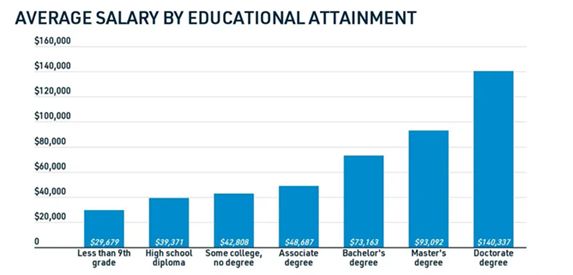AV Professionals: College… or not? It Depends on You!

The thesis of today’s (hopefully!) thought-provoking article is a paraphrase of Shakespeare's most famous speech from Hamlet, “To be or not to be - that is the question.” Our version will be “To go to college or not go to college - that is the question.” Both the Bard’s quote and our paraphrase are existential! Before proceeding, I want to establish what might look like my apparent bias. I am a college graduate and have post-graduate degrees. In fact, I am a former college professor and have over 40 years in the AV industry. I am probably best known for teaching at all levels of the industry and working on standards and certification programs. So… you already know which side my bias will fall, right? Wrong! My bias is not a bias at all, and this is where “it depends” comes into the picture (pun intended).
I will never denigrate attaining a college degree if that is required or it is a personal desire (for whatever positive motivation). Still, if that motivation is thinking you must have a degree to be successful, then I suggest you read on. To be sure, some fields of endeavor require a degree or even postgraduate work. Let’s put THAT to rest and move on. The following are a few examples of job educational requirements driven by a given profession's needs (laws, rules, regulations, etc.).
- Doctors, physician assistants, nurse practitioners, and other senior-level healthcare
- Dentists
- Psychologist and psychiatrist
- Educators (elementary, secondary, higher education, etc.)
- Accountants and CPAs
- Security, commodities, and financial services
- Engineers (architectural, mechanical, structural, civil, etc.)
- Lawyers
- Scientist (of any discipline)
It would not be me if I did not interject just a bit of history. I will begin post-World War II as the start of the exponential growth of college degrees. There was money to spend, the GI Bill, and a clear distinction between the blue-collar worker majority and those relatively few “higher” up the socio-economic ladder. Yes, there were exceptions… but this, along with home ownership, was the pinnacle of the famous “American Dream” and the era of “keeping up with the Joneses.” College was a step up (and in many cases) a step out of your situation. The aspiration for all was to be better off than your parents.
From this period until the turn of the century, attaining academic knowledge at a “higher level” resided in 4-year degree and postgraduate institutions and libraries throughout the country. If you wanted to be recognized as “smart,” you had to go there to get it physically. Of course, this began to change in the late 1990s with the creation of the internet and the access to information that has seen exponential growth since then, anywhere, any time, and at any location. For the most part, you no longer needed to go “there” to access it.
For decades, it was clear that college was the place to be if you wanted to make more money and elevate your social acceptance level. There was a deemphasis on the trades as “manual labor, " which was presented in unattractive terms (at best) or likely not presented at all. The words success and college were (with vestiges still today) inexorably linked. For those of us old enough, we will recall the economic and social implications (i.e., peer pressure)! There were exceptions with a breed of entrepreneurs, but this phenomenon did not take off until the mid-1990s. Okay… I will put my history book aside for now, but hopefully, you see whence we came, and our “newish” tipping point as the world of education and experience has/is changing.
Let’s begin by looking at standalone data from the US Bureau of Labor Statistics, the most recent census. Data shows adults with a bachelor’s degree earn an average of $2.8 million during their careers, which is $1.2 million more than the median for workers with a high school diploma. In addition, at every additional level of education, workers tend to earn more than those with less education.
Here are the median lifetime earnings of full-time workers by level of education:
- Less than high school - $1.2 million
- High school diploma - $1.6 million
- Some college, but no degree - $1.9 million
- Associate degree - $2 million
- Bachelor’s degree - $2.8 million
- Master’s degree - $3.2 million
- Doctoral degree - $4 million

Numbers don’t tend to lie… but in this case, they are used to show the median or average lifetime earnings and annual salaries. They are often used by proponents of higher education by default as a rationale to get as much college as possible. After all, just look at the numbers.
Here, a more expansive story diverges from the statistical averages and medians. Conflicting data exists related to how much you will earn with a college degree versus without one. According to research from Georgetown University, the lifetime earning potential of a worker with a bachelor’s degree is $2.8 million. Without a degree, the expected earning power is $1.6 million. But in a study of universities in Massachusetts, today’s college graduates were found to earn no more than high-school graduates. Plus, they must work 20 years to recoup the cost of their tuition. The median or average numbers do not account for some trades that make $70K to $100K or more per year. How about here in the AV industry, where non-college-educated people can earn $80K to $400K per year, depending upon the person and the situation? And no, these numbers are not outliers! This begs the big question of, “What’s up?”!
I now want to build the case for a new socio-economic reality. Here is a short list of historically notable people without a college degree. The common denominator in this entire list is individuality and thinking outside of the box... or better said, outside the college campus:
- Benjamin Franklin
- Abraham Lincoln, William McKinley, Harry Truman
- John D. Rockefeller
- Andrew Carnegie
- Frank Lloyd Wright
- Henry Ford
- Bill Gates and Paul Allen
- Steve Jobs and Steve Wozniak
- Michael Dell
- Jack Dorsey
- Mark Zuckerberg
- Bill Hewlett
- Michael Bloomberg
- Richard Branson
- Oprah Winfrey
- Stephen Spielberg
- Maya Angelou
It is about ROI
Decades ago, getting a college degree was perceived as the only route to a successful career… however, that is no longer an absolute. College enrollment rates are on the decline. As of spring 2022, enrollment has dropped by about 1.3 million students compared to 2020. A significant reason is due to cost and ROI.
The average price of college in the United States is around $35,551 per year, including books, fees, and living expenses. One expert notes, “To put that into perspective, the average cost of a public four-year school from 1989 to 1990 was $4,975. Even adjusted for inflation, the growth rate for tuition costs is so astronomical that it has outpaced what most can afford. Out-of-state costs have increased to 141%, and private tuition and fees to 134%.” A US News report shows that “college tuition costs have been on an upward trend for the last 20 years. In-state tuition and fees have grown the most, at a rate of 175%, and overall have outpaced the inflation rate by 171.5%!”.
It is not just about costs. The more significant problem is the student debt crisis. Currently, student debt amounts to over $1.6 trillion! For most middle to lower-class students to go to college in the US, they must get a loan. At one time, government Pell Grants could cover about 80% of tuition. Now, they barely cover 30%. Harvard statistics show that 42% of college students between 18 and 29 years have loan debts. In the same Harvard study, seven out of 10 millennials said that financial circumstances significantly influence whether or not they attend college.
An increasingly competitive labor market, rapidly changing job roles exacerbated by increasing college tuition and debt plus new online learning alternatives, has “created a tipping point in the perceived value of college degrees.” In a recent study, it was reported that “the percentage of jobs requiring a college degree fell from 51% in 2017 to 44% percent in 2021. And according to Gallup, the percentage of US adults ages 18 to 29 who view college education as “very important” dropped from 74% to 41% in just six years.”
Companies like Apple, Tesla, IBM, Delta Airlines, and Hilton, to name a few, no longer require a college degree for an interview. Disparate performance and productivity research showed “that the mindsets, abilities, and skills gained from life experience can be as valuable as university diplomas in today’s fast-changing world. Requiring diplomas significantly reduces the talent pool, leaving great candidates out of the hiring process before it even begins.” Research also showed that “possessing a college degree does not guarantee that a candidate will be any better at the job than someone without a degree. For example, employers feel that productivity levels are no different between degreed and non-degreed employees and that retention rates remain the same between workers with and without degrees.”
One study “found that employers believe applicants with a college degree are more “job-ready” than those without a degree. Specifically, employers feel that candidates with degrees possess more hard and soft skills than non-degreed candidates.” The study went on to show that the range of “hard” skills varied by field, but “the desired soft skills were generally the same across the board (including verbal communication skills and the ability to mentor other staff.” It was also found that most job postings that requested a bachelor’s degree did not contain different duties or added responsibilities than postings with the same title that didn’t require a bachelor’s degree. This begs the question of why you need a degree when the job’s duties and responsibilities are the same no matter how much education an employee has. Some companies continue to require applicants to have a college degree even though 63% of employers surveyed say that the degree requirements today make it harder to fill positions, and >60% of the workforce does not have a college degree. Think about supply and demand.
Shifting norms
Increasingly, organizations are proving that their work can be done without a degree. The new buzzword is “experience”. Harvard Business School’s study found that “37% of employers rank experience as the most important qualification in an applicant, not educational attainment. When a job is hard to fill, employers are more likely to overlook the lack of a degree when candidates have sufficient experience in place of the “right” education. And in large organizations (those with over 10,000 employees), experience is more important than a degree 44% of the time.”
According to the US Bureau of Labor Statistics, the average worker changes jobs 12 times in their career. That’s why both on-the-job and even general life experience is so important. One expert opines, “experience often advances new ways of thinking and develops abilities that aren’t necessarily constrained to a specific job. You can leverage what you gain from travel, internships, volunteering, hobbies, extracurricular activities, and more to build assets relevant to new opportunities, jobs that may not have existed a few short years before.”
Experience gives you the edge. Forbes says, “Today’s world changes faster than most college curriculums. A bachelor’s degree used to be the gatekeeper to an interview. That’s changing. But one thing is for sure: Regardless of who’s doing the hiring, everyone wants to know what experience you have. Whether you want to become a software programmer or social media marketer, experience is essential. The best job seekers, and the most forward-thinking companies, realize that translating experiences into more broadly applicable skills, abilities, and attitudes and beliefs about work, is the new name of the game. Clearly communicating your experiential intelligence can give you a leg up. The goal is to help employers understand how what you bring to the job right now can be applied to what’s needed today and may also be valuable for the future all at the same time.”
I can hear it now. “I don’t have any experience… so where does that leave me?” The other buzzword in today’s employment lexicon is “potential.” A recent study found that 45% of recruiters and hiring managers say a candidate’s potential is the most important aspect of their application. The study notes that potential isn’t just the likelihood of a candidate performing their job duties adequately (or even going above and beyond).” Employers define potential “as someone’s ability to grow into and beyond the job. They want people who will solve problems for the company and will, in the long run, bring value to their role.”
Try this one for those who can’t get beyond the aforementioned average and median labor-earning statistics. A new study from Georgetown University's Center on Education and the Workforce finds a growing number of people without a bachelor's degree are now outearning those with one. The study found that, on average, 16% of high school graduates and as much as 28% of those with continuing education beyond high school earned more money than half of all workers with a bachelor's degree.
The report suggests that a student's field of study, the type of job they're training for, and where they live can affect their earnings more than their degree. Tony Carnevale, one of the report's authors, says that "Your specific education has its value, and the value varies enormously. That's why somebody who can do one of the trades will make more than somebody who becomes a schoolteacher. And he goes on to say it is not just the trades. “Air traffic controllers, construction inspectors, respiratory therapists, and cardiovascular technicians (I add AV industry employment) all earn more than, or about the same as, the median bachelor's degree holder.”
Reasons not to go to college:
- Traditional college does not suit you
- College is expensive, and debt is a heavy load
- Miss out on work experience and income
- A degree does not guarantee a job
- Most jobs don’t require a degree
- Many successful people don’t have degrees
- You can gain the skills you need without a college degree
Need for continuing education
This does not mean you can rest on your K-12 laurels and be done with “education”! Learning is a lifelong process and the building block of the experience and creation of potential we spoke about earlier. If you enter the job market, you must prepare yourself to demonstrate the value you can provide to a potential employer. The following are a few examples of places/opportunities for continuing education:
- Community colleges offer training programs of all types that you can usually complete in two years or less. The average cost of an in-state community college is around $5K per year and $30K less than you’d pay to attend a university for a year.
- Technical colleges, trade, and vocational schools take around two years to complete. They usually include practical, hands-on training in your chosen field.
- Apprenticeship programs provide real work experience from people in your field. You’re also getting paid while learning. In the US, apprenticeships are often associated with trades like electricians and plumbers. However, there are also tech apprenticeships. You can learn data science, software engineering, digital marketing, and more.
- Online certifications and upskilling - Online learning has existed for decades, but the pandemic catapulted its growth. You can take plenty of free and affordable online courses to learn new skills.
- Volunteering is a practical way to gain experience and knowledge in a wide variety of circumstances.
All the average and median data and research point to the attainment of a college as a “better” long-term financial choice, but this does not tell the whole story. Increasingly, there are exceptions, and this group is growing exponentially. One example is that 6 of the top 10 fastest-growing US industries were part of the construction industry – which employs skilled trade workers extensively. The Bureau of Labor Statistics found that the most lucrative trade job in the US was a Construction Manager – with a top earning potential of over $77/hr. This is significantly more than college-educated computer science majors expecting to earn $33.65/hr in the first five years after school.
So why is this not more widely known? One problem is insufficient school counselors to help students make informed decisions. Recent studies from the National Association for College Admission Counseling show the student-to-counselor ratio was about 482:1. According to the report, schools should employ more career counselors to guide students through the complex web of post-high school options. "The simple advice to high school students to 'go to college' no longer suffices. Instead, counselors must walk students through the many different paths they can take.”
One excellent resource for the next career steps is the US Bureau of Labor Statistics. They offer tools to help people understand the earning potential of different careers. One of those tools, the Occupational Outlook Handbook, sorts out career options based on average pay, the level of education needed, and how much the profession is expected to grow over the next ten years.
Trade associations
The trade associations in areas that might interest you are significant resources to explore. For pro AV, there is AVIXA, and for digital signage, there is the DSF. Let’s look at certifications to help you along your AV, digital signage, IT, and project management (AV/DS/IT/PM) career paths.
So, which AV/DS/IT/PM certifications might be right for you? Don’t be confused by the seemingly endless numbers of so-called “certifications.” Every hardware manufacturer or software developer seems to have their own “certification” attached to their offerings. On the face of it, most vendor certifications are good… but our advice for best practices is to start with a full industry-recognized and approved curriculum in an area (think industry pervasive program as an umbrella) and then add individual courses to your new certifications.
AV/DS/IT/PM-related certifications for you
The “generalist” certification is one where the curriculum covers the broad scope of an industry and, in the process, teaches the fundamentals with some degree of specificity about the major segments.
Several good examples of this are the AV certifications from AVIXA (CTS), the Digital Signage Certified Expert (DSCE), Microsoft Certified Systems Engineer (MCSE), Cisco Certified Network Associate (CCNA), and the Project Management Professional (PMP) from the Project Management Institute.
AVIXA CTS
The AVIXA Certified Technology Specialist (CTS) certification covers all the basics of audio, video, design, and integration of an AV system. Beyond the CTS, as sub-specialties, there are Certified Technology Specialist - Design (CTS-D) and Certified Technology Specialist - Integration (CTS-I) designations. All the certifications are completed upon passing an in-depth exam before a person can publicly promote their Certified Technology Specialist (CTS). This entire process ensures a fundamental understating of each industry segment and illustrates how they all fit together.
Digital Signage Certifications
The Digital Signage Federation (DSF) and Digital Signage Experts Group (DSEG) provide education and certifications in digital signage. The DSEG Digital Signage Certified Expert (DSCE) certification represents the fundamentals. In contrast, the Digital Signage Network Expert (DSNE), Digital Signage Display Expert (DSDE), Digital Content and Media Expert (DCME), and Digital Signage Sales Professional (DSSP) certifications cover the sub-specialties. All the certificates are completed upon passing an in-depth exam before a person can publicly promote their certifications. This process ensures a fundamental understating of each industry segment and illustrates how they all fit together.
IT Certifications
Some of the oldest certifications are in IT. These programs are designed to address specific brands and product families from mega-companies like Microsoft and Cisco. For our purposes, they are lumped into the generalist category because they are pervasive and create the environment where many other products work. As with other recognized AV and digital signage certifications, each of the following takes time to study and review. Most importantly, they have comprehensive exams necessary to earn the coveted certificate of completion. Some of the most recognized programs that have relevance in AV and digital signage are:
- MCSE – Microsoft Certified Systems Engineer – Requires seven exams to complete!
- MCSD – Microsoft Certified Solution Developer – This certification is recommended by Microsoft for experienced IT professionals and people new to IT.
- CCNA – Cisco Certified Network Associate (CCNA) validates the ability to install, configure, operate, and troubleshoot medium-size route and switched networks, including implementing and verifying connections to remote sites in a WAN.
Project Management
Our last example of a recognized certification is the Project Management Professional or PMP from the Project Management Institute or PMI. Project managers take what the salesperson sold, and the designers designed, and coordinate the installation technicians to make the solution work to the end user's satisfaction. Experience is necessary to earn the PMP, but the rewards are significant and well worth the effort. PMPs earn a higher salary – up to 10% more than non-certified project managers.
Professional Development
The best path for professional development and advancement, irrespective of the industry, is to earn one or more recognized certifications. In the first place, professional certifications put all the elements of an industry and your experience in context rather than residing as a desperate group of facts and knowledge rolling around inside your head.
Specifically for AV/DS/IT/PM, certifications are proof positive to your employers, clients, and those outside of your inner circle that you are committed to your profession, not complacent, and actively seek the latest information available to make you and your efforts the best they can be.
This has the added benefit of giving people you come in contact with well-earned confidence in your abilities. Research has shown that certifications make you more valuable to employers… and all else being equal, the nod usually goes to the certified person in a company.
The following is a list of just some of the benefits of AV/DS/IT/PM certifications:
- Differentiation for employee and employer
- Professional credentials and industry recognition
- Eligibility for hiring and promotion
- Career improvement and advancement
- Earn higher wages
- Job Retention during turbulent times
- Salary commensurate with value
- Increased relevance in the industry
-
Cost reduction via improved efficiency and productivity
- Networking with other true professionals
There is a profoundly personal and often unspoken sense of pride and accomplishment that AV/DS/IT/PM certifications bring at all levels. Whether it is a CTS, PMP, DSCE, MCSE, or CCNA, each of these shows a dedication to be the best you can be personally and professionally.
It’s a wrap…
“To go to college or not go to college - that is the question.” The correct answer for each of us is that “it depends.” Yes, some professions require college degrees and beyond… if this is your core desire, this is fine, but as the songwriter Bob Dylan famously sang, “The times they are a changing.” There is a new norm. This is especially true in AV/DS/IT/PM… let me be clear: you do not need to go to a traditional 4-year college institution to be successful in an AV/DS/IT/PM job (and data backs this up). You DO need to keep learning, gain experience, and showcase your potential to prospective employers fueled with continuing education and industry certifications. Let the career, earnings, and success begin!





Please sign in or register for FREE
If you are a registered user on AVIXA Xchange, please sign in
Thanks for sharing, its very interesting how are the educative offer are so old to this facinate carrer in the Integration AV jobs.